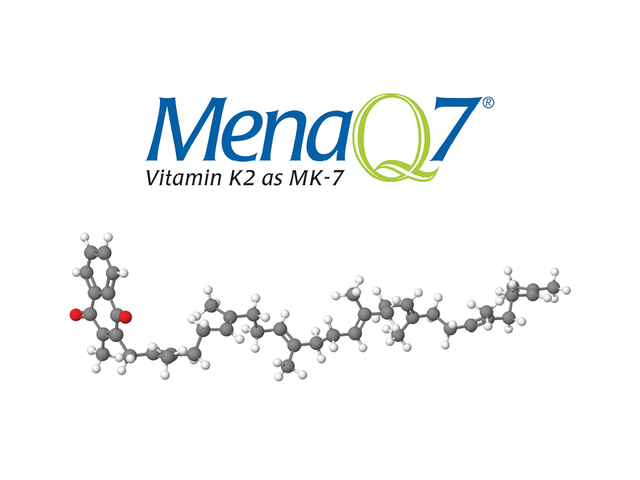
Scheda ingrediente
HYABEST (S) LF-P
Clinicamente testato Hyabest®,
il Sodio Ialuronato per il "Beauty from Within"

INTRODUZIONE
Inadequate calcium intake can lead to decreased bone mineral density, which can increase the risk of bone fractures. Supplemental calcium promotes bone mineral density and strength and can prevent osteoporosis (i.e., porous bones), particularly in elderly and postmenopausal women.[1,2] But the body needs adequate amounts of vitamin K2 as MK-7 to ensure that calcium is bound to the bone mineral matrix or else it is left rogue in the bloodstream.[3,4] Further, recent scientific evidence suggests that elevated calcium supplement consumption may raise the risk for heart disease, which can be connected with accelerated calcium deposits in blood vessel walls and soft tissues.[5,6]
In contrast, vitamin K2 is associated with the inhibition of arterial calcification and arterial stiffening[7,8], which means increased vitamin K2 intake could be a means of lowering calcium-associated health risks. However, since 1950, the consumption of vitamin K has decreased gradually[9], and even a well-balanced diet might not provide vitamin K in the amounts sufficient for satisfying the body’s needs. Further, due to modern manufacturing processes, the vitamin K content, particularly vitamin K2 content, of today’s food supply has significantly dropped, making vitamin K2 supplements a more reliable way to secure adequate intake.[10] By striking the right balance between calcium and K2 intake, it may be possible to fight osteoporosis while simultaneously preventing the calcification and stiffening of the arteries. A new clinical study with vitamin K2 supplementation showed an improvement in arterial elasticity and regression in age-related arterial stiffening.[11] Most important, through its activation of k-dependent proteins, vitamin K2 could optimize calcium utilization in the body, preventing any potential negative health impacts associated with increased calcium intake.
In order for the body to properly utilize calcium (i.e., directing it to bones while keeping it away from arteries and soft tissues), we need to obtain adequate Vitamin K2 as MK-7 daily.
References:
- Cumming RG, Cummings SR, Nevitt MC, et al. Calcium intake and fracture risk: results from the study of osteoporotic fractures. Am J Epidemiol. 1997;145:926-34.
- Hodgson SF, Watts NB, Bilezikian JP, et al. American Association of Clinical Endocrinologists medical guidelines for clinical practice for the prevention and treatment of postmenopausal osteoporosis: 2001 edition, with selected updates for 2003. Endocr Pract. 2003;9:544-64.
- Hauschka PV. Osteocalcin: the vitamin K-dependent Ca2+-binding protein of bone matrix. Haemostasis. 1986;16(3-4):258-72.
- Theuwissen E, Smit E, Vermeer C. The role of vitamin K in soft-tissue calcification. Adv Nutr. 2012 ;3(2):166-73. doi: 10.3945/an.111.001628.
- Bolland MJ, Avenell A, Baron JA, et al. Effect of calcium supplements on risk of myocardial infarction and cardiovascular events: meta-analysis. BMJ. 2010;341:c3691.
- Xiao Q, Murphy RA, Houston DK, et al. Dietary and supplemental calcium intake and cardiovascular disease mortality: the National Institutes of Health-AARP diet and health study. JAMA Intern Med. 2013;173:639-4
- Beulens JW, Bots ML, Atsma F, et al. High dietary menaquinone intake is associated with reduced coronary calcification. Atherosclerosis. 2009;203:489-93.
- Geleijnse JM, Vermeer C, Grobbee DE, et al. Dietary intake of menaquinone is associated with a reduced risk of coronary heart disease: the Rotterdam Study. J Nutr. 2004;134:3100-5.
- Prynne CJ, Thane CW, Prentice A, Wadsworth ME. Intake and sources of phylloquinone (vitamin K(1)) in 4-year-old British children: comparison between 1950 and the 1990s. Public Health Nutr. 2005;8(2):171-80.
- E. Theuwissen et al. Vitamin K status in healthy volunteers. Food & Function 2014.
- Knapen MHJ et al. Menaquinone-7 supplementation improves arterial stiffness in healthy postmenopausal women. A double-blind randomized clinical trial. Thrombosis and Haemostasis. 2015 May;113(5):1135-44.

Vitamin K2 is a member of the K family of vitamins, whose integral characteristic is the property of activating enzymes that modify certain proteins to allow them to bind calcium. The vitamin K family is divided into vitamin K1 – one molecule (phylloquinone) and vitamin K2 -- a group of molecules (menaquinones).[12,13]
Vitamin K2 is a group of compounds called the menaquinones (1 through 13). It works by activating special proteins that allows the body to properly utilize calcium. One of such proteins is osteocalcin, and another is matrix Gla protein (MGP). The former attracts calcium where it is needed most, namely into bones and teeth. The latter works like a broom by sweeping calcium out of places where it is needed least, namely soft tissues like veins and arteries. Proteins already present in the body need cofactors to be able to function properly. These cofactors are helper molecules like vitamins or minerals. For instance vitamin K2 is the cofactor for an enzyme called vitamin-K-dependent carboxylase. The VKDPs (= vitamin K dependent proteins) are activated by a process called gamma-carboxylation, during which the structure of osteocalcin and MGP is altered by adding another carboxyl group to allow those proteins to bind calcium. In case of vitamin K2 deficiency, they remain “under-carboxylated” or inactive[12,14].
Not all forms of Vitamin K2 are created equal. The two most commonly commercialized forms of Vitamin K2 are menaquinone-4 (MK-4) and menaquinone-7 (MK-7). Due to its side chain, MK-7 has a much longer half-life in the body than MK-4, allowing it greater access to tissues beyond the liver. Further, the serum half-life of MK-4 has been shown to last a few hours compared to a 3+ day half-life for MK-7.
So although they have the same molecular mechanism of action, MK-7 is more bioavailable than MK-4. And due to MK-4’s short half-life and poor bioavailability, it requires multiple doses per day at milligram levels – versus MK-7’s microgram levels – for measurable efficacy.
References:
12. Rheaume-Bleue, Kate. 2013. Vitamin K2 and the Calcium Paradox: How a Little-Known Vitamin Could Save Your Life. Harper; Reprint edition.
13. Howard, Larry M., Payne, Anthony G.. 2006. Health Benefits of Vitamin K2: A Revolutionary Natural Treatment for Heart Disease and Bone Loss. 1st edition. Basic Health Publications, Inc
14. Willems A.G, Vermeer C, Reutelingsperger CPM, Schurgers LJ. 2014. The realm of vitamin K dependent proteins: Shifting from coagulation toward calcification, Mol. Nutr. Food Res. 58, 1620-1635.
MECCANISMO D'AZIONE
MenaQ7® Natural 2000 ppm CryoCap
MenaQ7® Natural 2000 ppm GMS Powder
MenaQ7® Natural 10000 ppm SNF Oil
MenaQ7® Natural 2000 ppm MCC Powder
MenaQ7® Natural 1500 ppm MCT Oil
MenaQ7® Natural 1500 ppm SNF Oil
MenaQ7® PharmaPure 10000 ppm MCT Oil
MenaQ7® PharmaPure 10000 ppm MCT Powder
MenaQ7® PharmaPure 2000 ppm CryoCap

COMPOSIZIONE E SPECIFICHE TECNICHE

EFFICACIA
MenaQ7® Vitamin K2 as MK-7 has been the source material for 20 human clinical trials published in respected peer-reviewed publications (with more currently underway). These trials have been conducted in healthy and patient populations, in adults as well as children. The most impactful are:
• A 3-year study of 244 healthy post-menopausal women taking 180mcg dose of MenaQ7® Vitamin K2 as MK-7 daily yielded unprecedented results:
Bone: Clinically statistically significant protection of the vertebrae and the hip (femoral neck) against bone loss was the result of a daily nutritional dose of MenaQ7®. After 3 years of supplementation, maintenance in both bone mineral content and bone mineral density were statistically significant in the MenaQ7® group, as well as statistically improved bone strength.[15]
Cardiovascular: Using pulse wave velocity and ultrasound techniques, researchers observed the Stiffness Index ß in MenaQ7® group with initial high arterial stiffness had decreased significantly compared to the slight increase in the placebo group after 3 years of supplementation at a nutritional daily dose. Results confirmed that MenaQ7® not only inhibited age-related stiffening of the artery walls, but also made a statistically significant improvement in vascular elasticity.[16] These findings are significant because this is the first time any form of vitamin K has shown these benefits. This is also true for other therapies – to date, no compound has demonstrated these benefits.
• A 2008 study published in the British Journal of Nutrition revealed that daily supplementation with 45-50 mcg of Vitamin K2 as MK-7 (as MenaQ7® from NattoPharma) may support bone needs from early childhood through the lifespan. Monitoring healthy children between 6 and 10 years of age taking 45-50 mcg of MenaQ7® for 2 years resulted in improved vitamin K status as well as stronger, denser bones.[17]
References:
15. Knapen MHJ et al. Three-year low-dose menaquinone-7 supplementation helps decrease bone loss in healthy postmenopausal womenOsteoporos Int. 2013 Sep;24(9):2499-507.
16. Knapen – Knapen MHJ et al. Menaquinone-7 supplementation improves arterial stiffness in healthy postmenopausal women. A double-blind randomized clinical trial. Thrombosis and Haemostasis. 2015 May;113(5):1135-44.
17. van Summeren et al. The effect of menaquinone-7 (vitamin K2) supplementation on osteocalcin carboxylation in healthy prepubertal children. Br J Nutr (2009) 102(8): 1171-8.

SICUREZZA
MenaQ7® PharmaPure 2000 ppm CryoCap MCC Powder Grades
MenaQ7® PharmaPure MCT Oil Grades
MenaQ7® PharmaPure MCC Powder Grades
MenaQ7® Natural 2000 ppm CryoCap
MenaQ7® Natural 10000ppm SNF Oil
MenaQ7® Natural MCC Powder Grades
MenaQ7® Natural 1500 ppm MCT Oil
MenaQ7® Natural 1500ppm SNF Oil
MenaQ7® Natural 2000 ppm GMS Powder

IMPIEGO E PROCEDURA D’UTILIZZO
The MenaQ7® product range offers the most comprehensive selection of high-quality Vitamin K2 derived from fermentation or organic synthesis, providing you more flexibility and opportunity when developing your product portfolio. Both MenaQ7® Natural and MenaQ7® PharmaPure follow the same standard of an all-trans, high-purity concentration. Bioequivalence studies confirm the efficacy of all MenaQ7® Vitamin K2 as MK7 product lines. MenaQ7® products offer a wide range of concentrations as either oil, powder, or microencapsulated solutions, making them available in a wide range of finished product dose forms, such as capsules, chewable tablets, soft gels, and dispersible formats.










